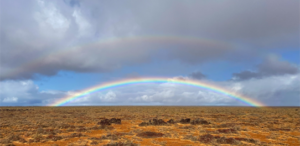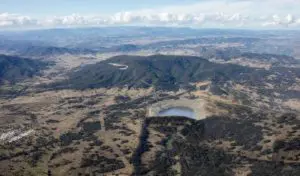Queensland’s Labor state government has announced new guidelines for local government and renewable energy developers as the state prepares to embrace another 16 large scale solar projects that are queuing up to join the grid.
Queensland energy minister Anthony Lynham says 13 large scale solar farms have been built or are under construction in an “unprecedented wave” of renewable energy investment extending from Lakeland near Cooktown in the far north to the town of Dalby in the south-west.
This had already brought $1.3 billion in investment and almost 1,500 construction jobs to Queensland, and more than 650MW of renewable energy to the grid.
“And the good news is there’s more to come, with another 16 solar projects on the way bringing $3.4 billion dollars and 2600 jobs to regional and rural locations right across the state,” Lynham said during a visit to Risen Energy’s 100MW Yarranlea solar project near Toowoomba.
The new Queensland Solar Farm Guidelines – unveiled along with planning minister Cameron Dick – are the government’s response to calls from regional communities and industry for “certainty” in planning procedures. Some solar farms have created controversy in local communities.
“These guidelines are a clear checklist for local governments about what’s needed for sustainable, community and industry-led large-scale solar development,” Lynham said.
“It’s essential that communities, landholders, investors and governments at all levels can work together to make sure the next wave of investment happens sustainably.
“For traditional owners, communities and landholders the guidelines outline approval processes, technical and environmental considerations, ways to give feedback, information on the stages of solar development and what a new solar project can mean for a community.
“For industry, these guidelines provide a one-stop-shop guide on navigating government development approvals, expectations about best practice to engage the local community, location guidance and the legal framework which governs solar farm developments.
The guidelines, which can be found here, focus on the “social licence” to operate – a key consideration for a developer of any type of technology.
“Social licence is not something that, once earned, is fixed and unchanging,” the document says. “It varies over time in response to changes in the community and developers’ behaviour. It is therefore something that has to be renewed and earned every day and a goal towards which the industry should constantly strive.”
Dick said the guidelines would assist Queensland local governments to plan and regulate proposed solar farm development appropriately, to ensure potential impacts are balanced against the jobs and economic activity.
“The guidelines will support local government to identify where solar farm development is appropriate in their community and establish appropriate assessment provisions in their planning scheme,” he said in a statement.
“Local government will remain as the assessment manager for solar farm development applications, but the State Government will continue to work with councils to ensure the guidelines are effective and where needed, provide additional support.”







